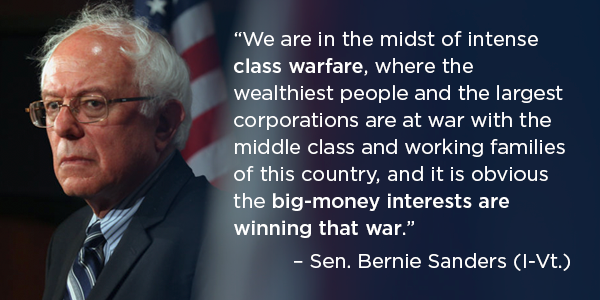Ben & Jerry's co-founder Jerry Greenfield speaks on Capitol Hill, July 10, 2014
“People understand that the game is rigged”: Ice cream icon Jerry Greenfield explains why he’s sweet on Bernie for prez
Sanders' early success shows how serious Americans are about getting money out of politics, Greenfield tells Salon
Anyone following the Democratic primary knows that when it comes to high-profile endorsements, this otherwise neck-and-neck race is something of a rout. Most of the party’s leading interest groups and individuals — the figures that comprise what Sen. Bernie Sanders has called “the political establishment” — are all-in with Hillary Clinton. It isn’t even close.
But while Clinton may have Planned Parenthood, the American Federation of Teachers, Rep. John Lewis and the SEIU in her corner, Sanders has got two names that — among Democratic voters, at least — may carry even more weight. One is “Ben”; the other is “Jerry.”
Because Salon has spoken with Ben (full name: Ben Cohen) about Sanders already, it felt like the time was right to get Jerry (full name: Jerry Greenfield) on the phone to talk inequality, “Bernie,” as he prefers to call him, and 2016. This conversation has been edited for clarity and length.
Best Pax Posts On Bernie Sanders
http://paxonbothhouses.blogspot.com/2016/02/best-pax-posts-on-bernie-sanders.html
http://paxonbothhouses.blogspot.com/2016/02/best-pax-posts-on-bernie-sanders.html


...the aggressively ignorant:

Reprise: "Mediocre Philosophy Sells: It Makes The Half Literate... Feel Smart
Be honest: Did you expect the Sanders campaign to be this successful?
I am quite surprised. Ben and I have been constituents of Bernie for over 30 years in Vermont and we understand how genuine he is, how consistent he is, how driven he is by working for fairness, justice and equality and overcoming a rigged political and economic system. But I was not aware that there were people around the country who also were following what Bernie was fighting for, and that were going to be so enthusiastic in terms of their support for him, so I’m very pleasantly surprised.
How do you explain it?
Bernie is not politics-as-usual. He’s someone who tells the truth, he speaks from his heart, he doesn’t use political speak. And when people hear him talk about how the political system is rigged for the advantage of the ultra-wealthy and corporations, when they hear him talk about how the economic system is rigged by those same groups, they know in their hearts that he’s right. People understand that the game is rigged. We may not all be sure what to do about it or we may not be sure how to address it, but we all know that it’s absolutely true. And to have somebody be speaking that so plainly is very motivating.
The other thing about Bernie [is that] he is not funded by special interests. He is the only candidate running for president that doesn’t have a super PAC, he is funded by individuals with small contributions; the average contribution is less than $30, and as Ben sometimes likes to say, “just follow the money.” It’s not the fossil fuel industry that’s funding Bernie, it’s not Wall Street that’s funding Bernie, it’s not the pharmaceutical industry the same way those entities are funding all the other candidates. He is not bought and sold.
Do you think the Clinton campaign’s “single-issue candidate” talking point is going to work?
No. Bernie is certainly not a one-issue person. However, if you look at the way the political system works in our country, the way that campaigns are funded, the way that lobbying is done. All of those things involve huge amounts of money that are coming from corporations and very wealthy people. And if you want to get at any particular issue, whether it’s the environment, whether it’s healthcare, whether it’s Wall Street, the only way to address that is to fundamentally take the money out of the political system. That is the starting point. You’re never going to get at those unless you have somebody in office who is essentially not for sale.
Do you think the Sanders campaign will “go negative” if it looks like Clinton is starting to pull away? More of what Clinton has called an “artful smear“?
As I said before, Ben and I have been represented by Bernie for over 30 years. He has never run a negative campaign. He talks about issues; and I think what the Clinton campaign might have been referring to was this issue of money and politics. And what Bernie said was that the system itself — because of the amount of money in politics — is broken. It is rigged. He wasn’t pinpointing anyone in particular. He was just saying it is no coincidence that all of these special interests get taken care of [in Washington] and the average working person — the average vet, the average senior, student — is not getting treated fairly.
From what you’ve seen, knowing him for all these years, how competitive of a person is Sanders? Will it be enough for him to know that his campaign was influential; or will he feel like he’ll be a failure if he doesn’t win?
No comments:
Post a Comment